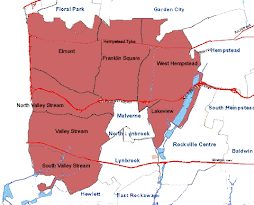COMMISSIONER MULVEY AND NCPD EMERGENCY AMBULANCE BUREAU ISSUE SUMMER HEAT SAFETY TIPS
Summer is here and along with it comes hot and humid conditions. Rising temperatures, and upcoming heat waves can create a dangerous environment for the residents and visitors of Nassau County. In an effort to help prevent heat related medical conditions, we have put together some tips to keep Nassau residents aware of the signs and symptoms of heat related medical conditions such as dehydration, heatstroke, and heat exhaustion. In addition, we have also listed some tips on how to prevent heat stroke and dehydration and how to treat heat stroke and heat exhaustion.
“I would like to remind residents to dial 911 at the first sign of a medical emergency,” said Commissioner Mulvey. “In addition, I also ask that residents check on their family, friends and neighbors, especially if they are senior citizens.”
Signs & Symptoms:
Heat Exhaustion
· Severe thirst
· Fatigue
· Muscle cramps
· Aches
· Muscle weakness
· Nausea and/or vomiting
· Fast, shallow breathing
· Irritability
· Headache
· Increased sweating
· Cool, clammy skin
· Elevation of body temperature to 105 degrees Fahrenheit or higher
Heat Stroke
· Severe throbbing headache
· Dizziness
· Disorientation, agitation or confusion
· Sluggishness or fatigue
· Seizure
· Hot, dry skin that is flushed but not sweaty
· A high body temperature
· Loss of consciousness
· Rapid heart beat
· Hallucinations
Dehydration
· Thirst
· Less-frequent urination
· Dry skin
· Fatigue
· Light-headedness
· Dizziness
· Confusion
· Dry mouth and mucous membranes
· Increased heart rate and breathing
In children, additional symptoms may include dry mouth and tongue; no tears when crying; no wet diapers for more than 3 hours; sunken abdomen, eyes or cheeks; high fever; listlessness; irritability; skin that does not flatten when pinched and released.
How Heatstroke Can Be Prevented·
Drink plenty of fluids during outdoor activities; water and sports drinks are preferred; tea, coffee, soda and alcohol should be avoided
· Wear lightweight, tightly woven, loose-fitting clothing in light colors
· Schedule vigorous activity and sports for cooler times of the day
· Protect yourself from the sun by wearing a hat, sunglasses and using an umbrella
· Increase time spent outdoors gradually get your body used to the heat
· During outdoor activities, take frequent drink breaks and mist yourself with a spray bottle to avoid becoming overheated
· Try to spend as much time indoors as possible on very hot humid days
How dehydration Can Be Prevented
· Drink plenty of fluids, especially when working or playing in the sun
· Make sure you are taking in more fluid than you are losing
· Drink appropriate sports drinks to help maintain electrolyte balance
· Infants and children should be given Pedialyte to maintain their electrolyte balance
How to treat Heatstroke and Heat Exhaustion
· Bring the person indoors, or into the shade immediately
· Remove their clothing, and gently apply cool water to the skin followed by fanning to stimulate sweating
· Apply ice packs to the groin and armpits
· Have the person lie down in a cool area with their feet slightly elevated
Tuesday, June 29, 2010
Subscribe to:
Post Comments (Atom)


No comments:
Post a Comment